Occupational Medicine
Research Colloquium
Tuesday
22 April 2008 Emirates Aviation College, Dubai |
|
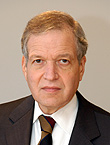 | Professor
Robert Thurer, CAO, HMSDC
Dr.
Robert Thurer is Chief Academic Officer of the Harvard Medical School
Dubai Center Institute for Postgraduate Education and Research (HMSDC),
the educational and research component of Dubai Healthcare City
(DHCC). He is also Executive Director of the Dubai Harvard
Foundation
for Medical Research. Dr. Thurer brings extensive experience
in
clinical care, medical education and research to Harvard’s
collaboration with DHCC.
HMSDC,
the first Harvard Medical School facility of its kind to be established
outside of the United States, will focus primarily on postgraduate
specialty training and continuing medical education. This postgraduate
focus will help alleviate the limited availability of training
opportunities currently available in the region and will position Dubai
as a unique medical education center in the region.
Before
coming to Dubai, Dr. Thurer practiced cardiothoracic surgery at Harvard
Medical School in Boston where he was Associate Chief of Thoracic
Surgery and Head of the Thoracic Oncology Program at the Beth Israel
Deaconess Medical Center. He was educated at Dartmouth
College and
Medical School and received his MD degree from Harvard Medical
School.
He did his surgical training at the Massachusetts General Hospital in
Boston and the Cleveland Clinic Foundation in Cleveland and is
currently an Associate Professor of Surgery at Harvard Medical School.
_____________________________________________________________________________________
|  | Dr
Robin Griffiths, Senior Lecturer, University of Otago, NZ
Dr
Griffiths is the Academic Coordinator of occupational medicine and
aviation
medicine courses at the Wellington School of Medicine, University of
Otago, New Zealand which enrolls students around the world in its
distance learning programme. Rob holds consultancies to the Airways
Corporation of NZ, the Transport Accident Commission, the Accident
Compensation Corporation, Emirates and Etihad Airlines and other
agencies around the world. He was previously Chief Medical Officer of
the NZ Ministry of Transport and a lecturer in aviation medicine in the
Royal Air Force, UK.
_____________________________________________________________________________________
| 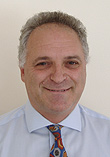 | Nick
Kendall, Senior Lecturer, University of Otago, London
Dr
Nicholas Kendall trained as a clinical psychologist and now works as a
health service consultant based in London. He works in evidence-based
healthcare, and psychosocial contributions to musculoskeletal pain
problems. He has research interests in occupational rehabilitation,
musculoskeletal medicine, and spine surgery. He served previously as
manager for evidence-based healthcare with the Accident Compensation
Corporation in NZ, as a senior lecturer in orthopaedics &
musculoskeletal medicine, and as clinical director of a large
multidisciplinary pain service. While serving as chairman of the NZ low
back pain project he coined the term “yellow flags” to describe risk
factors for work loss and wrote a guideline on this topic.
_____________________________________________________________________________________
| 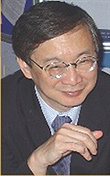 | Professor Tar-Ching Aw
Head, Dept of Community Medicine
UAE University
Al Ain
United
Arab Emirates.
_____________________________________________________________________________________
| 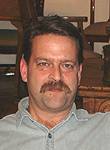 | Michael Haney
Michael has been
on the teaching staff of the University of Otago for several years and
has contact with students in most areas of the Aviation Medicine
curriculum.
He
completed a Bachelor of Arts, then studied medicine and continued with
training first in anaesthesia (then later in thoracic anaesthesia) and
intensive care. Clinical focus has been mostly intensive care medicine
for the last 15+ years. He became involved in aviation medicine first
as a reservist military flight surgeon over many years. Later
(even currently), he has worked quite actively in civilian intensive
care patient transport systems in Sweden. His primary job,
though, is academic, mixing clinical ICU work with teaching and
research activities at Ume� University in Sweden, where he is a senior
member of a large study group focused on cardiovascular
physiology. Most of his energy goes to supervising Ph.D.
students and supporting studies which are conducted in a large animal
laboratory.
_____________________________________________________________________________________
| 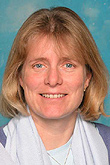 | Dr Sarah Dean
Sarah
has two research themes that reflect her interest in the psychology of
health and illness in the rehabilitation setting. Her particular
passion concerns understanding and promoting adherence to exercise.
The
first theme concerns the application of health psychology theory to
rehabilitation practice. This research has focused on using
our understanding of illness perceptions for facilitating adherence to
therapeutic exercise. In a controlled clinical trial, involving 139
patients with low back pain, physiotherapists were asked to take an
illness perception approach to facilitate their patients’ adherence to
home exercises. The physiotherapists adopted more patient-centred care
and an interaction between adherence and the intervention was noted but
did not reach statistical significance. Several illness perception
constructs significantly predicted low back pain disability.
Translating an illness perception intervention into measurable
improvements in adherence and outcome remains a challenging but
exciting research endeavour!
Another project under
this research theme investigates the relationship between perceived
self-efficacy and the reporting of musculoskeletal pain in the general
population as little is known about this relationship. This project has
stimulated further study utilising a prospective design and also has
potential for developing an intervention trial.
Her
second research theme involves using qualitative research as a method of
enquiry
for the first theme. Her expertise lies in the methodology known as
Interpretative
Phenomenological Analysis and she has close links with the leading
proponent of this methodology, Dr Jonathan Smith from Birkbeck, London.
_____________________________________________________________________________________
|
|
|
|
 |
|
